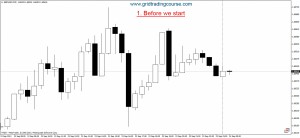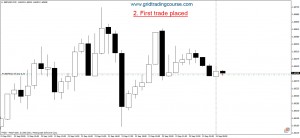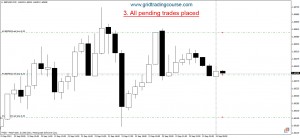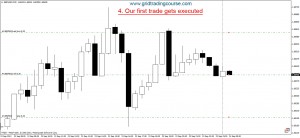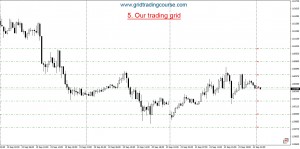Now, that we know what a trading grid is, let’s see how we can create one. Well, it is pretty simple. First, we need to choose our Base Line and our Grid Step. And second – we need to place the trades according to them. That’s it!
Let’s do an example, let’s say we want to create a trading grid on GBPUSD. Here’s what our chart looks like before we start:
We want to create a short trading grid. This means that we will be executing sell trades only. Furthermore we decide to use a grid step of 20 pips. Why? Because it is a convenient number, easy to make calculations with. In other words it is a pretty random choice, we use it for this example only. In real life you should backtest and thus decide on a proper value.
Next thing we do is to choose our Base Line. We want it to be close to the current price, at some round number for convenience. In our case this can be 1.6040. We place a pending sell trade there. This is how we start our trading grid – by placing a trade on the closest (to the current price) grid line. It can be a pending trade if the current price is far enough. Or it can be a market order – if the current market price is really close to this grid line, then just wait until it gets to it and then execute the order:
Once we have our first order in place (pending or market) we continue with the next ones. We cover the neighboring grid lines. Remember, our base line is at 1.6040 and our grid step is 20 pips. This means that our grid lines above the base one are at 1.6060, 1.6080, 1.6100, etc. And the grid lines below (the base line) are at 1.6020, 1.6000, 1.5080, etc. We cover them with pending trades i.e. we place a pending sell order on each and every one of them:
Shortly after we placed all our pending trades, the first one, at our Base Line got executed:
We placed a total of 7 trades, 1 at our base line and 3 on each side of it. Here’s how the chart looks when we zoom out:
Congratulations! We’ve just created our first trading grid! Do you see it? It looks like there’s a grid of trades on the chart. This is our trading grid. This is where Grid Trading gets its name too…
